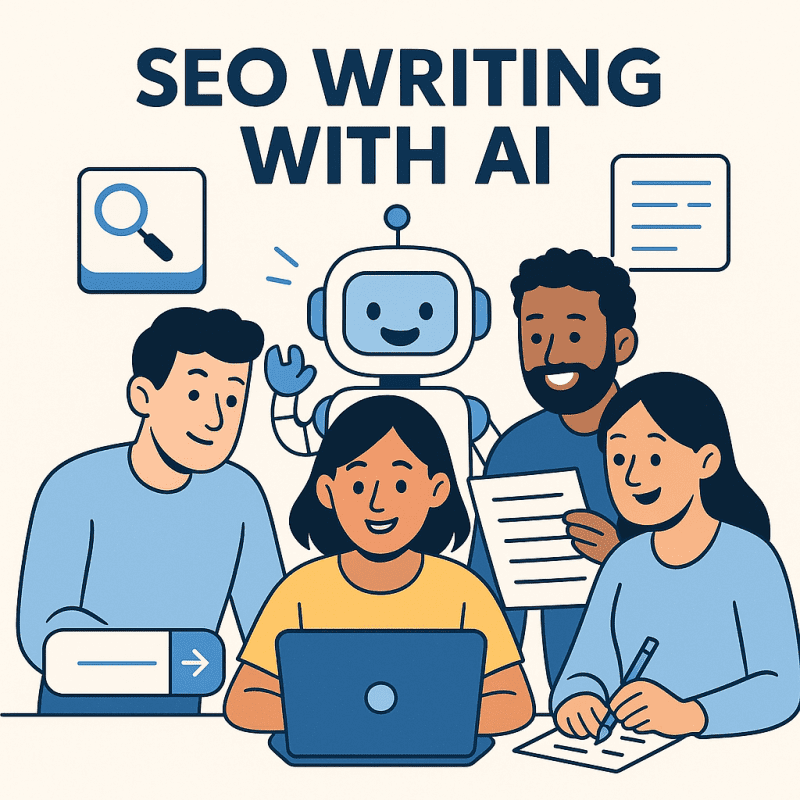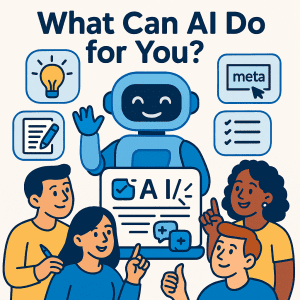Smarter Content, Faster Results
AI tools like ChatGPT are changing how we write content – and that includes SEO. Instead of staring at a blank screen, you can now use AI to generate keyword-rich content quickly, efficiently, and creatively. But to get the best results, you still need a human touch.
This guide explains how to use AI to help write SEO-friendly content, what AI can and can’t do, and how to keep your writing authentic and effective.

🧠 What Is AI SEO Writing?
AI SEO writing refers to using artificial intelligence tools to help create search-optimised content. These tools can generate blog posts, landing pages, FAQs, product descriptions and more—based on your instructions and keywords.
🛠️ What Can AI Do for You?
- 💡 Suggest blog topics based on keyword ideas
- ✍️ Write first drafts of articles or sections of content
- 🧾 Create meta titles and descriptions
- 🔗 Help structure your content with headers and bullet points
- 📢 Rewrite or improve existing content for clarity and tone
🚫 What AI Can’t Do (Yet)
- ❌ Understand your brand voice fully
- ❌ Replace real expertise or unique opinions
- ❌ Fact-check content—always verify!
- ❌ Judge accuracy in regulated industries (like finance, legal, health)
📌 How to Use AI for SEO Writing
- 🧭 Start with keyword research—don’t rely on AI to choose keywords
- 📝 Write a clear prompt (e.g. “Write a 500-word blog post about the benefits of local SEO for dentists”)
- 📄 Break long posts into sections and ask AI to help with each one
- 🧹 Edit thoroughly—refine tone, correct mistakes, and add your voice
🤖 Best AI Tools for SEO Writing
- 🟢 ChatGPT – Versatile and powerful
- 🟣 Jasper – Great for marketing teams
- 🟠 Copy.ai – Quick content creation
- 🔵 SurferSEO – AI plus on-page SEO optimisation
💡 Tips for Writing SEO Content with AI
- 📌 Use keywords naturally—AI can follow your lead
- 📚 Focus on helpful, well-structured content
- 📢 Add a human tone: examples, experience, and empathy
- 🔁 Don’t copy and paste—always edit and review
✅ Quick Recap
- 🤖 AI can help you write faster, but you’re still in charge
- 🔍 Start with solid keyword research
- 📝 Give AI specific instructions and edit its output carefully
- 🧠 Add real value with insights, examples, and human language
Also Read:
- How to Create SEO Content That Does Not Sound Like SEO Content
- AI Detection Tools vs Humans: Can Google Tell the Difference?
🤖 Final Thoughts
AI can be a powerful ally in crafting SEO-friendly content, but it’s not a magic bullet. Rather than letting an AI writer handle everything, use it to speed up research, generate topic ideas and suggest natural phrasing. Always guide the tool with clear prompts—define your target keyword, audience tone and desired structure—and be prepared to edit heavily. Human oversight ensures your content remains accurate, engaging and aligned with your brand voice, while AI handles the heavy lifting of drafting outlines or brainstorming related questions.
Start by feeding AI a brief: ask it to produce a skeletal article with headings optimised for your chosen keywords, then refine each section with original insights, examples and data. Use AI to rephrase repetitive passages, generate meta descriptions or craft social-media snippets—but never to mass-produce posts without review. Finally, analyse AI-assisted drafts with readability tools and SEO plugins to confirm keyword placement, content depth and user experience. By blending AI’s speed with your expertise, you’ll build rich, well-targeted content that satisfies search engines and resonates with real readers—delivering sustainable organic growth without sacrificing quality.
📝 Recap and Clarify: Page-Specific FAQs
Can AI tools really help with SEO content writing?
Will using AI content hurt my Google rankings?
How can I make sure AI-generated content sounds human?
What’s the best AI tool for SEO writing in 2025?
Should I disclose when content is AI-generated?
Can AI handle keyword research too?
How do I optimise AI content for SEO?
What are the risks of relying too heavily on AI for writing?
Can AI-generated content help with featured snippets?
Will AI replace SEO writers completely?
🔁 Up Next!
Blog Content Tips – Creating blog content isn’t just about putting words on a page—it’s about solving problems, answering questions, and showing your expertise in a way that’s valuable to your readers and visible to search engines.
Video Recap – 🤖 SEO Writing with AI — How to Create Content That Still Ranks
AI can write blog posts in seconds – but can it write good SEO content? In this video, I’ll show you how to use AI tools wisely to create content that’s original, helpful, and built to rank.



